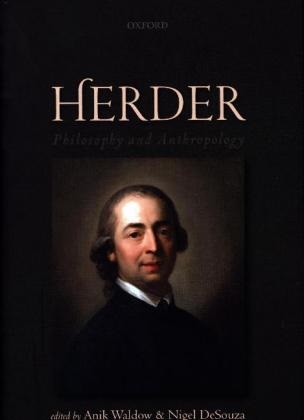Read more
Zusatztext This collection does much of what one would like a collection of essays to do. First, and importantly, it provides a nice, representative cross-section of Herder scholarship today, including pieces by established scholars whose work initiated and promoted philosophical scholarship on Herder -- such as Taylor, Heinz, Bollacher, Zammito, Forster, and Beiser -- as well as contributions from newer scholars (or scholars newer to Herder). It correspondingly treats many central themes in Herder's philosophical corpus, and does so from differing perspectives ... It not only represents the -- encouragingly flourishing -- state of scholarship on Herder, as noted, but also contributes fruitfully to that discussion, both in providing informative historical contextualization of Herder's views (Herder was a thinker deeply engaged with the thought of his contemporaries) and in raising interesting philosophical and interpretive questions. Informationen zum Autor Anik Waldow is Associate Professor in the Philosophy Department at the University of Sydney. She mainly works in early modern philosophy and has published widely on the moral and cognitive function of sympathy, early modern theories of personal identity, scepticism and associationist theories of thought and language, and the influence of artifice and nature in the enlightenment debate. She is the author of the book David Hume and the Problem of Other Minds (Continuum, 2009), and co-edited Contemporary Perspectives on Early Modern Philosophy: Nature and Norms in Thought (Springer, 2013)Nigel DeSouza is assistant professor in the Department of Philosophy at the University of Ottawa. He works on the philosophy of Herder, early modern philosophy, and on contemporary ethics. He has published articles on Herder's metaphysics, epistemology, philosophy of language, and moral philosophy, as well as on the foundations of ethical agency. His articles have appeared in The British Journal for the History of Philosophy, Intellectual History Review, Herder Yearbook, and Ethical Theory and Moral Practice. Klappentext Thirteen scholars offer new essays exploring the question at the heart of J. G. Herder's thought: How can philosophy enable an understanding of the human being not simply as an intellectual and moral agent, but also as a creature of nature who is fundamentally marked by an affective openness and responsiveness to the world and other persons? Zusammenfassung Thirteen scholars offer new essays exploring the question at the heart of J. G. Herder's thought: How can philosophy enable an understanding of the human being not simply as an intellectual and moral agent, but also as a creature of nature who is fundamentally marked by an affective openness and responsiveness to the world and other persons? Inhaltsverzeichnis Introduction Part I: Towards a New Philosophy: Philosophy as Anthropology 1: An Interview with Charles Taylor: Philosophy as Anthropology 2: Marion Heinz: Anthropology and the Critique of Metaphysics in the Early Herder 3: Nigel DeSouza: The Metaphysical and Epistemological Foundations of Herder s Philosophical Anthropology 4: Stephanie Buchenau: Herder: Physiology and Philosophical Anthropology 5: Stephen Gaukroger: The Role of Aesthetics in Herder s Anthropology 6: Dalia Nassar: Understanding as Explanation: The Significance of Herder s and Goethe s Science of Describing Part II The Human Animal: Nature, Language, History, Culture 7: John Zammito: Herder between Reimarus and Tetens: The Problem of an Animal-Human Boundary 8: Anik Waldow: Between History and Nature: Herder s Human Being and the Naturalisation of Reason 9: Kristin Gjesdal: Human Nature and Human Science: Herder and the Anthropological Turn in Hermeneutics 10: Johannes Schmidt: Herder s Religious Anthropology in His Later Writings 11: Martin Bollacher: Individualism and Universalism in Herder s Concep...

